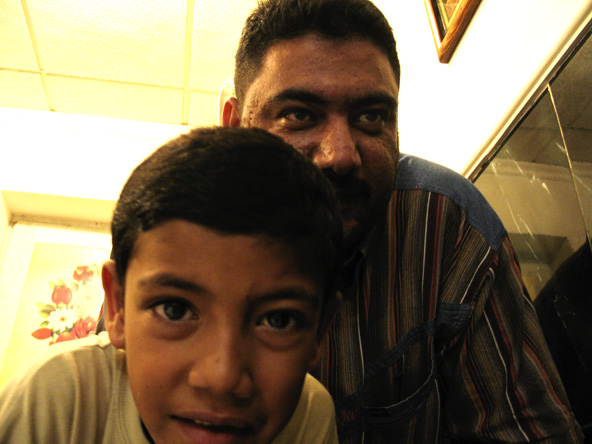
6 June, 2006, Baghdad, Iraq. Members of the Dulaime family, longtime Sunni businessmen in Karrada, take refuge in their own hotel because it is too dangerous for them to move around Baghdad.
Photo: Phillip Robertson
Ahmed confirmed that Abu Dereh is a Mahdi Army commander, but defended him, saying that he only targeted guilty people for interrogation, that the accusations in Shalshal al Iraqi's letter were false. "He just takes Salafis," Ahmed said, referring to the Sunni fundamentalists, including members of Zarqawi's al-Qaida in Iraq movement, who espouse a fundamentalist return to the religion in the time of the Prophet and sanction the killing of Shiites. Shiites often refer to people involved in the mosque bombings in their parts of town as Salafis or Takfiris, but these terms are for the most part epithets, convenient labels used to justify the killing.
Muqtada al-Sadr is almost certainly aware of what is happening in Sadr City. Recently, one of Saddam's defense lawyers, a man named Obeidi, was abducted from his house, bound and taken to Sadr City, where he was publicly executed and his body dumped in front of a portrait of Muqtada Sadr's venerated father, Mohammed Sadiq al-Sadr. On the day I left Baghdad, June 23, clashes broke out between the Mahdi Army and Sunni groups, in a neighborhood battle that drew in U.S. attack helicopters and closed down the city entirely. It was the first sign of open conflict between the two sides in the new civil war, which has since begun raging out of control.
I met one of the victims of that civil war the day I went to talk to the Mahdi Army representative Rikabi. After I left the Sadr office, I drove for five minutes down Al Shu'ala's dusty main street, and turned off onto a side road. Walking alone under the crucible sun in her black abaya was a woman of middle age carrying groceries. When I stopped the car to give her a ride, she climbed in, gave me a blessing, and immediately pulled out the death certificate for her son and began to weep. We had just turned off the main road onto an abandoned army base where half-constructed houses stood among piles of yellow bricks. This was Chikook, a squatters camp for Shiite families fleeing sectarian violence, managed by the Mahdi Army. Two police SUVs guarded the entrance, but I was able to drive straight through without being stopped. The woman, whose name was Leila Hassan Hammadi, directed me to her house, a section of the army barracks, and invited us to come inside to the cool dark of the house. A thousand dollars paid to someone she would not name had bought her two rooms, joined by a hole punched in the concrete wall. Hammadi's three school-age daughters quietly materialized from behind a partition to bring out orange drink and bruised apples. Hassan, who is desperately poor, explained that her family had fled Taji, where some of the worst sectarian attacks have been.
"My son was only a child and they threw him in the trash," Hammadi said, in a seizure of anguish. From a plastic bag where she kept her important papers, she took out postage- stamp-size pictures of her 18-year-old son Ali and her husband and handed them to me. "They kidnapped my husband." When I asked who had killed her son and taken her husband, she said she didn't know and was silent for a moment. "After they killed Ali, we received a letter at our house that said we had to leave in one week. It said if we see you a week from now, we will kill all of you. We didn't leave. That's when my husband was kidnapped." The date on Ali's death certificate was November 6, 2005.
Hammadi and her daughters had been displaced for more than seven months. Without a man
in the house, her only source of support was the Mahdi Army. Her refusal to describe the
attackers is completely normal in Iraq. As I left, Hammadi begged for my help, for any
contacts with human rights group that could support widows. "I am in a special situation,"
she said. "Please."![]()
© Phillip Robertson, 2009-2014.
